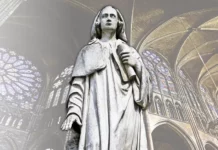Surrounded by a thousand dangers, the young missionary deepened his devotion to Our Lady. And he promised to write the Mother of God’s life in verse, if She would preserve his purity.
T he origin of the Poem to the Virgin is linked to one of the heroic episodes in the history of the Brazilian nation, displaying the spirit of faith, confidence in Providence, spiritual fortitude and refined diplomatic tact of St. Joseph Anchieta, an admirable man of God.
Perilous embassy to the Tamoios
From the first years of the foundation of Piratininga in the captaincy of São Vicente, the Tamoio Indians had been harassing the Portuguese settlements, in union with the Tupis of the wildlands. The attacks had become almost incessant in 1559, when the Tamoios allied themselves with the French settled in Rio de Janeiro. Defeated by the Governor-General Mem de Sá in 1560, they incited the natives to a general insurrection, which threatened to completely destroy the Portuguese colonization of the region and, with it, the Catholic Faith.
Fr. Manoel da Nóbrega and Brother Joseph Anchieta,1 setting out as peace ambassadors in May 1563, arrived on the beaches of Iperoig, now Ubatuba. There they spent months of continuous uncertainty between life and death in the midst of the Tamoios, without succeeding in establishing an accord. In the meantime, Fr. Nóbrega was called to São Vicente, where his presence was urgently needed.
However much it pained him to see the venerable superior leave at such a juncture, Anchieta preferred the common good to his own, willingly offering to stay among the enemy until it pleased God to soften their hearts and bring them to a settlement.
A promise to the Blessed Virgin
Alone in the midst of a lawless people, Brother Joseph passed through this entire period like a lily among thorns. Daily life with the natives, which for anyone else would have been disastrous, served to strengthen and give new lustre to his virtue.
For a young man in the prime of life, it was very trying to be surrounded by a thousand occasions of sin, countless dangers and scandals of all kinds; and, what is more, deprived of the Sacraments, without a good book to read or a spiritual director to support him. He therefore redoubled his vigilance over himself, promptly stifling the slightest movement of nature that could undermine virtue.
He intensified his devotion to the Blessed Virgin, entrusting to Her in a special way the care of his heart and his purity. And he promised to commit the Mother of God’s life to verse, if She would guide him through the situation in which he found himself, without any stain that would tarnish the pure lily of his chastity.
Engraved in the sand and in his memory
When he felt exhausted, the young Jesuit would take a walk on the beach, and there he would fulfil his promise, composing on the sand, in Latin verses, the life of the Blessed Virgin.
Whoever reads the touching allegories, symbols and figures taken from the Sacred Scriptures and the Holy Fathers, with which the poem is filled, does not know what to admire more: the author’s pious inspiration, or his genius, erudition and doctrine, which he left thus consigned for the praise of the Queen of the Universe and the edification of the faith of future generations.
How pleased Heaven was with the composition is clear from eyewitness accounts, which state that a beautiful little bird of splendid and varied colours was often seen flying around Anchieta while he was writing his poem, and resting either on his shoulders, his head or his hands. 2
For her part, the Virgin was faithful to the pledge, preserving his purity of soul and life itself intact, even when on the sunny beach the terrible cannibals made sure the missionary heard this threatening phrase: “Have your fill of the sun, because soon we will kill and eat you.” To which he quietly replied: “You shall not to kill me; my time has not yet come.” 3
Conversion won by sweetness

Such was the Saint’s conduct during the three months he remained alone among the savages. The gentleness of his manner and the uprightness of his unblemished habits won over their hearts, so that at last a peace treaty was established, to the great satisfaction of both parties.
After publicly giving thanks to God for such an outstanding benefit, he prepared to leave for São Vicente, which was very difficult for him, because he could not forget the favours he had received from Providence there in Iperoig. Like St. John on the Island of Patmos, he loved that place which, from a land of exile, had become his beloved home. He saw, moreover, that the native peoples were amenable to civilization, as long as skill and a true apostolic spirit were employed. It broke his heart to leave a region where so much good remained to be done.
The Indians themselves, in turn, were opposed to his leaving, for, having changed their attitude, they now conceived a heartfelt love for him. They could not resign themselves to the absence of the man of God who had so assisted, consoled and helped them in their afflictions. His departure was heroic; holy obedience called him and he did not hesitate.4
Finally, on September 21, 1563, after almost five months away, Anchieta entered São Vicente to open the precious treasure of his memory and give the world the pearls of inestimable value of the poem of almost six thousand verses that he had engraved on the sands of Iperoig.
The poem
As a sample, we present some extracts from the famous Poem to the Virgin. The offering transcribed below evinces the sublimity that runs through the entire literary piece from beginning to end:
To sing or to fall silent? / your praises, Most holy Mother of Jesus / shall I sing them or keep them silent? / The restless mind / feels impelled by the spur of love / to offer some verses to its Queen…
But it fears, with impure tongue / to proclaim thy glories: / faults without number encumber it with stain. / How can earthly tongue dare to extol / Her who bore the Omnipotent in her womb?5
Centuries before the dogmatic definition of the Immaculate Conception, and witnessed only by Angels and the disquieting stares of fierce Indians, the cantor of the Immaculate expresses himself with the following lines on the sands of the Land of the Holy Cross:
Conceived, as we were, in a mother’s womb, / only Thou, O Virgin, wert free from the stain / that blemishes all others, / and with thy heel dost Thou crush / the head of the coiled dragon, / its disgraced brow is held fast under thy foot / All fair with dazzling radiance, / no shadow was found in Thee, sweet friend of God!6
And seized with zeal for orthodoxy, against the insolence of the Calvinist heresy which attacked the perpetual virginity of the heavenly Queen, he declares:
As he fails to see the rays of divine light, / imparting the brilliance of thy body and soul, / he robs Thee of the honour of perpetual virginity […]. / With blackened and leprous heart, / he casts arrows at Thee, poisoned with viper’s gall. / Monster, why are you swollen / with the envy of the old Serpent? / Why do you, with madly grinding teeth, malign / the beauty of the Virgin Mother? […] / Do you dare, venomous snake, / to touch, with your accursed tongue, / the purest white bed of the eternal God?7
With a brief dedication, the poem ends in a cry of love to the Virgin, in the burning desire for martyrdom and with a noble sentiment of humility:
Here are the verses that long ago, O Holy Mother, / I pledged to Thee by vow, / seeing myself surrounded by fierce enemies. / While, among the rebellious Tamoios, / as a poor hostage, I advocated the longed-for peace, / thy grace enfolded me / in thy maternal mantle / and thy veil guarded intact my body and soul. / At Heaven’s inspiration, / I often desired to suffer/ and to expire cruelly in harsh irons. / But my desires were met with deserved rejection: / such glory is fitting for heroes alone!8

Flower sown throughout Brazil
Praising the virtues of the Apostle of Brazil, Dr. Plinio Corrêa de Oliveira solemnly affirmed in the National Constituent Assembly of 1934:
“In Anchieta, vas electionis,9 a flower of virtue had sprung up, and this flower he sowed throughout Brazil: it is gentle meekness, linked to the serene but inexorable energy, which is the axis of our soul.”10
Let us confidently ask that, at the behest of this incomparable hero of the Faith, Our Lady of the Conception Aparecida, Patroness of Brazil, obtain for us, at the current historical crossroads through which the nation is passing, extraordinary graces so that our country may indeed become the Land of the Holy Cross of which its founders dreamt, and whose grandiose future was prophesied by St. Joseph Anchieta in the epopee The Saga of Mem de Sá: “When the Brazilian peoples observe the doctrine of Christ, a golden age will be established for centuries in this southern world!”11◊
Hymn of Love to the Divine Wound
In his Poem to the Virgin, St. Joseph Anchieta dedicates some verses to the Sacred Heart of Jesus, wounded with love for the salvation of men. He thus preceded St. Margaret Mary Alacoque, who in the following century would receive from the Saviour himself the mission of spreading this devotion throughout the world.
O sacred wound, it was no iron spear that opened thee, but rather the passionate love that Jesus had for our love that opened thee!
O torrent that flowed in the heart of Paradise, of thy waters the earth is imbued and made fruitful!

O royal road, jewelled gate of Heaven, tower of refuge, shelter of hope!
O rose exhaling the divine scent of virtue! Precious stone with which the pauper buys a throne in Heaven!
Nest in which the snow-white doves place their eggs, in which the chaste turtledove feeds its fledglings.
O red wound that glows with immense beauty and wounds the hearts of its friends with love!
O lesion that opened with the spear of love, through the divine breast, a wide path for the Christ’s Heart!
Proof of untold love with which He drew us to himself: port which harbours the ship in the storm!
To thee fly those pursued by the dread enemy, remedy to cure any ill!
From thee the sorrowful will drink consolation and remove the burden of sadness from their oppressed heart.
The hope of the poor convict will not be dashed who, forsaking fear, enters the palaces of Paradise, by your way.
O abode of peace! O perennial stream of living water that gushes unto eternal life!
Only within Thee, O Mother, was this laceration inflicted, only Thou dost suffer it, only Thou canst bear it.
Let me enter into that breast pierced by iron and abide in the Heart of my Lord; by this road I will reach the depths of this holy love; there I make my resting place, my eternal home.
There I will plunge my crimes into the river of His Blood, and cleanse the vileness of my soul, in this crystalline water. In this abode, this cove, how sweet it will be to live the rest of my days, and there, at last, to die!12
Notes
1 St. Joseph Anchieta was ordained a priest three years later, on June 6, 1566, in the Cathedral of Salvador.
2 Cf. SAINTE-FOY, Charles. Vida do Venerável Pe. José de Anchieta. São Paulo: Jorge Seckler, 1878, p.43-47.
3 VIEIRA, Celso. Anchieta. 3.ed. São Paulo: Companhia Editorial Nacional, 1949, p.210
4 Cf. SAINTE-FOY, op. cit., p.47-48.
5 ST. JOSEPH ANCHIETA. Sobre a Virgem Maria Mãe de Deus. 5.ed. São Paulo: Paulinas, 1996, p.57.
6 Idem, p.59.
7 Idem, p.140-141.
8 Idem, p.340.
9 From Latin: vessel of election (cf. Acts 9:15).
10 CORRÊA DE OLIVEIRA, Plinio. 98th Session, March 19, 1934. In: Opera Omnia. Reedição de escritos, pronunciamentos e obras. São Paulo: Retornarei, 2009, v.II, p.63.
11 ST. JOSEPH ANCHIETA. De gestis Mendi de Saa, apud VIOTTI, SJ, Hélio Abranches. Anchieta, o Apóstolo do Brasil. 2.ed. São Paulo: Loyola, 1980, p.237.
12 ST. JOSEPH ANCHIETA, Sobre a Virgem Maria Mãe de Deus, op. cit., p.278-279.







